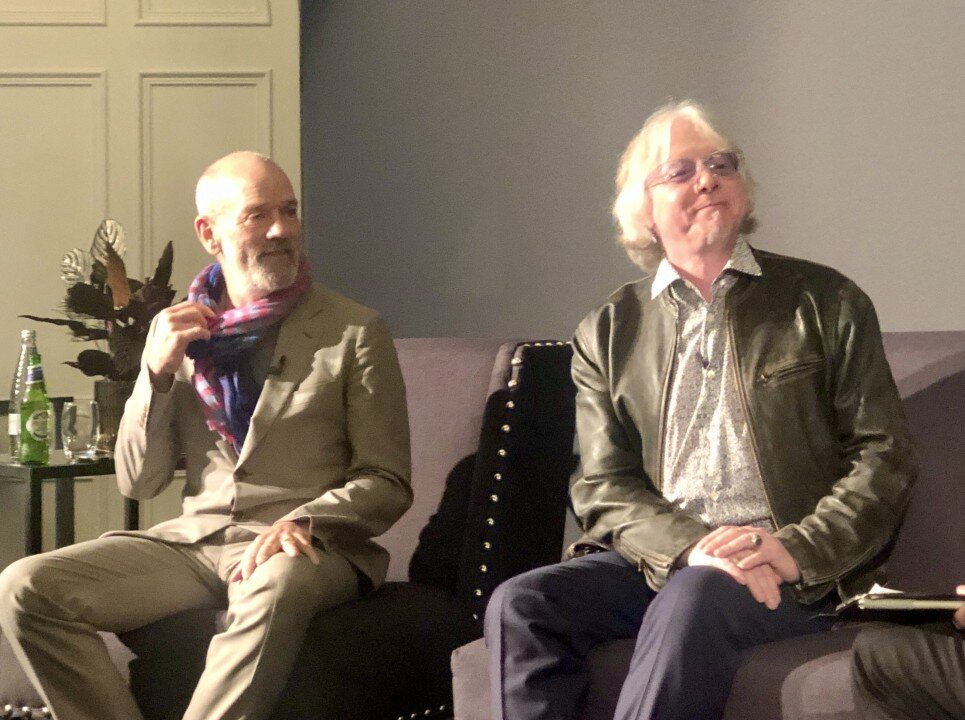Six Business (and Life) Lessons from R.E.M.
R.E.M.'s Michael Stipe and Mike Mills (poorly taken photo by the author)
Last summer I visited Seattle for the first time, and felt nostalgic for all the grunge music I remembered from the 90s. I played Pearl Jam, Nirvana, and the soundtrack of Singles on heavy rotation. But there was one other alt-rock band whose music I owned before all of those – not just on CD, but on cassette and cassingle – R.E.M.
I remember trying to figure out the lyrics to It’s the End of the World as We Know It (just like Chris Farley and David Spade did in Tommy Boy) or mimicking the choreography from Stand. And of course, forever associating Losing my Religion with Dylan and Brenda’s break-up on 90210.
So, when I heard R.E.M.’s lead singer Michael Stipe and bassist Mike Mills were doing a talk in London for the 25th anniversary of their album Monster, I jumped at the chance to see them in person.
After nearly four decades in the music industry, I knew they'd have a lot of stories to share. Here are six lessons I took away that can help you in business – and life:
1. Success takes time
It took R.E.M. 11 years before they had real fame. They spent almost the entirety of 1989 on the road touring, but it was after 1991’s release ‘Out of Time’ that fame really hit the band. Said Stipe: “I was used to getting recognized by a few people, but then everyone recognized me.”
2. Diverse perspectives make things better
Mills and Stipe talked about the different styles the four bandmates had, and how it affected the way they created music together.
“The four of us came from different directions,” said Mills. “And that made it complex – and wonderful.”
3. Help others – and make work fun
R.E.M. were both friends and mentors to up-and-coming bands like Nirvana and Radiohead. Stipe and Mills spoke of the friendship they shared with Kurt Cobain, and the fun they had together.
In fact, Stipe wrote Man on the Moon as a challenge with Cobain.
“Kurt and I were trying to see who could write a song with the most ‘yeahs’ in it,” he said with a laugh. [Ed. Note: There are 56 mentions of ‘yeah’ in 'Man on the Moon']
4. Watch out for the trap of perfectionism
Despite selling millions of albums, the band still felt the pressure in the recording studio. Their different styles helped them creatively, but could also lead to conflict.
Guitarist Peter Buck “wanted to make a record in four days” said Mills. “Michael and I were more… reflective.”
Mills added:
“You can always find something else to do. At some point, you have to stop. You can make it different, but not better.”
5. You never know what people will like
1992’s Man on the Moon peaked at number 30 on the US Billboard Hot 100; however, it became one of R.E.M.’s most popular songs with live audiences.
The band didn’t tour until two years after the song was released – so they had no idea people would respond to it as enthusiastically as they did.
“We hadn’t performed it live, so we didn’t know how much people liked it – or the energy we'd get from the crowds.”
That enthusiastic response saw the band move Man on the Moon to the last song they played at their live shows.
6. Stay humble
After 11 months on the road in 1989, the band took a five-year break from touring. During that time, they released their two best-selling albums: Out of Time (Losing my Religion, anyone?) and Automatic for the People (Everybody Hurts).
During that time, they went from being the darlings of college radio to selling out stadiums. They were, at that time, one of the biggest bands in the world.
So, what did Michael Stipe learn from that?
“Humility,” he said.
Mills and Stipe mentioned some of the bands they had opened for in their early days – and some of the poor treatment they received from the ‘more famous’.
“We learned a lesson from those bands – and we said, ‘We’re not going to treat bands like that,” said Mills.
“We’re a club band – who happens to play arenas.”
Beth Collier is a communication consultant who brings her love of pop culture into her workshops and coaching practice. She still can’t recite the lyrics from ‘It’s the End of the World as We Know It’ but holds her own on a lot of other R.E.M. songs.
If you want to find out how to become a stronger leader, writer or speaker (or you’re curious why she thinks ‘Losing my Religion’ is so creative), contact Beth at beth@beth-collier.com.
You can find out more about her services here.

